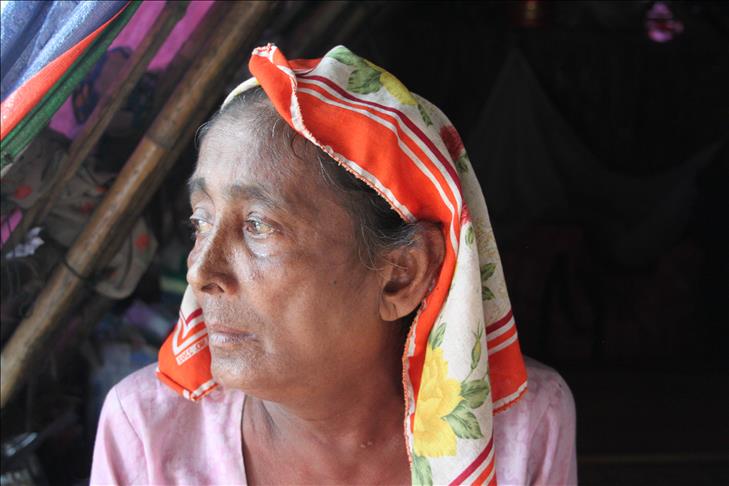
By Joshua Carroll
SITTWE, Myanmar
Mabya Hadu isn’t able to celebrate the Islamic festival of Eid. For three years, she has been confined to a small, flimsy hut in a squalid camp on the outskirts of Sittwe in Myanmar, unable to move far after being struck by a motorbike.
Destitute, the elderly Rohingya lady bemoaned that she can’t even afford to make sudki - a traditional sweet dish enjoyed by Rohingya on Eid morning, which marks the end of the month of fasting during the holy festival of Ramadan.
Other modest traditions like buying and wearing new clothes to mark the day - among the most significant in the Islamic calendar - are also beyond her means.
“Last year it was the same,” she told the Anadolu Agency on Tuesday, before pointing to the patches of scarred skin on her legs where the motorbike’s exhaust pipe burnt her.
Penniless, in pain, unable to work and surviving on handouts from the World Food Programme, desperate measures were called for.
“I had to sell some of my food rations for medical treatment,” she says
Hadu, however, is not alone in her pain. Many other Rohingya in Sitwe's camps will also miss Eid in this year. While a process of sweeping government reforms introduced in 2011 has raised the hopes of many across Myanmar, the Rohingya’s suffering has continued to get worse and worse.
In mid-2012 Buddhist rioters tore through Hadu's village near downtown Sittwe, the capital of Myanmar’s western Rakhine state. They burned it to the ground, hacking and beating Muslims to death as they went. Where once a thriving Muslim community stood, there is now little more than an empty field.
The violence swept across Rakhine and then into central Myanmar; around 140,000 people are believed to have fled their homes. Most were Rohingya, who are now confined under an apartheid-like system to Sittwe's disease-ridden camps.
“Eid is very different now,” Abdul Salam, a camp committee member at the Dapaing Internally Displaced Persons camp where Hadu lives, told AA. “People here are suffering with disease.”
He estimates that about 50 people in the camp have died of conditions including diarrhea and malaria since aid workers providing desperately needed medical care were forced to evacuate Sittwe in March after being targeted by rioters.
Nationalist Rakhine Buddhists regard many international aid groups working in the state as biased towards the Rohingya, who they say are interlopers from neighboring Bangladesh.
Most aid workers have been able to return since the March riots. And last week the Rohingya were offered a glimmer of hope when the government invited the Noble Prize-winning charity Medicins Sans Frontieres to return to the state after ejecting the group in February. But the terms on which MSF will be allowed to operate are unclear and the group says the people of Rakhine face a humanitarian crisis.
Hundreds of men in traditional white panjyama clothes and fori hats poured into a mosque in Baw Du Bar village on Tuesday morning for Eid prayers. Afterwards, choirs sang Islamic songs outside and many of the men made the short walk to pray at the graves of their loved ones, another Eid tradition, in the cemetery next to the mosque.
In the middle of the waterlogged graveyard, soaked with the monsoon rain, three men stood around a bamboo fence surrounding a small rectangle of land that marked the final resting place of 14 people who died in the riots in 2012.
After the riots many of Myanmar’s Muslims refrained from celebrating Eid as a gesture of solidarity with the Rohingya, and also because of fears the festival could spark more violence.
Since then, in the face of desperate conditions, Rohingya have kept tradition alive in the camps. After morning prayers Tuesday, boys and girls in colorful new clothes made their way along dusty tracks to visit family members in neighboring villages.
Unlike most of the Islamic world, which celebrates Eid over three days, the Rohingya only celebrate for one day.
“We are happy on Eid, it’s a time of celebration,” said Aung Win, a local community leader and activist. “But really we are not happy in our hearts. After 2012 we became IDPs because the Rakhine… destroyed our houses.”
“Many people are languishing in these camps. Some people have no money to celebrate."
“I am very sorry for those people who cannot celebrate,” he added, holding back tears. “Maybe because of the mercy of Allah they can also be happy.”
Ma Muna, who fled to the camps around Sittwe after violence in her village of Pauktaw, has been unable to do anything for her six children this Eid.
“Today we got food rations but it isn’t enough… I have no money to buy flour so we can’t make sweets. I’ve just been sitting here with the other mothers.”
Hadu remembers the last she enjoyed the sweet dish of sudki - made with flour, butter, groundnuts and coconut shavings. It was 2011.
“I had just a little then,” she said, “but I was happy, what little money I had I spent on celebrating Eid.”
Anadolu Agency website contains only a portion of the news stories offered to subscribers in the AA News Broadcasting System (HAS), and in summarized form. Please contact us for subscription options.

